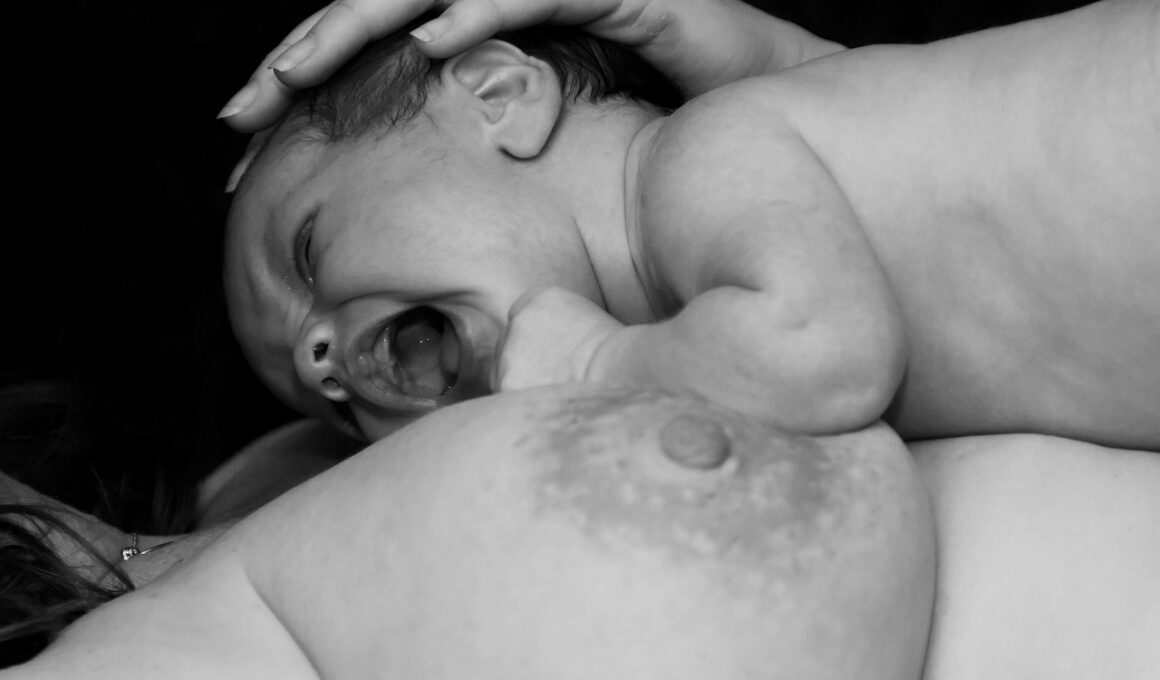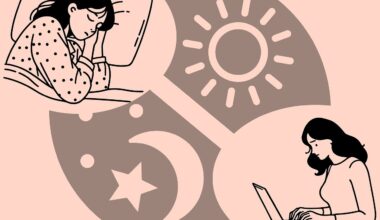How Fitness Can Help Speed Postpartum Recovery
Postpartum recovery is an essential phase for new mothers, and engaging in regular fitness can significantly facilitate this process. After childbirth, women undergo various physical and emotional changes. A focused fitness program helps restore strength, increases energy levels, and enhances mood. Light to moderate exercise, such as brisk walking, swimming, or yoga, can aid muscle recovery, support mental health, and improve overall well-being. Incorporating fitness into a daily routine not only allows for physical recovery but also boosts self-esteem as mothers rediscover their body’s capabilities. Moreover, fitness provides an opportunity to connect with other new mothers, fostering social support. Engaging in group fitness classes encourages motivation and accountability, offering a sense of community while navigating motherhood. This support system can be invaluable for emotional wellness during such a transformative time. Prioritizing fitness also allows mothers to better manage stress and anxiety, which are common in the postpartum period. Finding time for exercise can be challenging, but by prioritizing fitness, mothers can create a healthier and happier family environment.
One of the most significant benefits of postpartum fitness is its impact on physical health. Engaging in regular exercise enhances cardiovascular health, strengthens muscles, and regulates weight. Many new mothers experience weight gain during pregnancy, which might lead to disappointment and difficulty in managing their bodies post-baby. Establishing an exercise routine assists in burning calories, thus facilitating weight loss and reshaping the body. Additionally, it strengthens core and pelvic floor muscles, which can be weakened from pregnancy and childbirth. Techniques such as Pilates and stretching focus on these crucial areas, aiding in recovery. Aerobic exercises like walking are beneficial for improving stamina, making it easier to care for a newborn. Research indicates that physical activity can also support the healing process after a C-section or vaginal delivery. Furthermore, exercising releases endorphins, the body’s natural pain relievers, which can help ease postpartum discomfort. Incorporating exercises tailored for postnatal recovery encourages mothers to see improvements while reducing the risks associated with a sedentary lifestyle. Therefore, those who prioritize fitness during postpartum can experience a smoother transition into motherhood with increased physical capabilities.
The psychological aspect of postpartum recovery is just as crucial as physical health. New mothers often experience mood swings, anxiety, and postpartum depression. Regular fitness activities can significantly alleviate these symptoms through the release of endorphins. Exercise serves as an effective tool for regulating mood and reducing feelings of stress. Social interaction fulfilled through group exercises and fitness classes can also enhance emotional well-being. Having a network of support during this challenging life stage helps alleviate feelings of isolation and loneliness that many new mothers experience. Furthermore, yoga, a mindful practice, can develop mental resilience, improve focus, and enhance relaxation. These practices encourage mothers to stay present during challenging moments with their babies. Creating a balanced exercise schedule not only assists with recovery but also allows mothers the time to process their emotions healthily. Setting achievable fitness goals encourages a sense of accomplishment. This positivity translates into other aspects of life, leading to a happier relationship with their newborns. In summary, incorporating fitness into a daily routine can improve mental health and strengthen the connection between mother and child.
Setting Realistic Fitness Goals
When beginning a postpartum fitness journey, setting realistic and achievable goals is vital. New mothers should focus on personal challenges rather than societal pressures to ‘bounce back.’ Fitness should be a fulfilling experience rather than a source of stress. It’s essential to recognize that each woman’s body responds uniquely to pregnancy and recovery. Initial goals might include engaging in daily walks, participating in postnatal fitness classes, or incorporating gentle stretching routines. Gradually increasing workout intensity can prevent burnout and injuries, ensuring a sustainable fitness journey. Tracking progress helps keep motivation levels high, allowing mothers to celebrate small victories. Creating a support system amongst friends or joining online communities can provide necessary encouragement and advice during recovery. Furthermore, consulting a fitness professional specializing in postpartum recovery can optimize workout plans. This personalized approach ensures safety and effective progress. By embracing a realistic timeline and focusing on gradual improvements, new mothers can foster a healthier lifestyle while nurturing their well-being and that of their children. Remember, every small step taken towards fitness is a testament to the strength of motherhood.
Nutrition also plays a critical role in facilitating postpartum recovery alongside fitness. New mothers have unique dietary needs, especially if they are breastfeeding. Incorporating a balanced diet filled with nutrients is essential for energy replenishment and overall health. Consuming meals rich in whole grains, lean proteins, fruits, and vegetables can support physical recovery. Hydration is equally important as it aids blood circulation and supports milk production. New mothers might experience fatigue, so prioritizing nutrient-dense meals can sustain energy levels throughout the day. Additionally, attending to portion sizes will help in managing weight effectively. Meal prepping can simplify daily nutrition, making healthy eating more accessible and less time-consuming. Some mothers might find it beneficial to involve their babies in the process, turning meal preparation into family bonding time. This playful approach helps new moms maintain their focus on healthy eating while enjoying the company of their little ones. Lastly, integrating nutritional education alongside fitness routines can empower mothers to make informed dietary choices. This well-rounded approach ensures they are well-equipped to meet the demands of motherhood and personal well-being.
Incorporating Mindfulness in Fitness
Mindfulness is an integral aspect that can enhance the effectiveness of postpartum fitness. Engaging in fitness routines with a mindful approach can increase body awareness and reduce the likelihood of injuries. By focusing on the breathing patterns during exercises, mothers make their workouts more effective. Practices like yoga and Pilates incorporate mindfulness techniques, promoting relaxation and mental clarity. These exercises encourage mothers to connect with their bodies, allowing a deeper understanding of their limits and capabilities. Mindful exercising can also result in stress reduction, contributing significantly to improved mental health during postpartum recovery. Listening to one’s body helps in recognizing the need for rest, which is vital during this transitional phase. Additionally, setting aside dedicated time for mindfulness practice before or after workouts can contribute positively to emotional well-being. Meditation or simple deep-breathing exercises can enhance the workout experience. Ultimately, incorporating mindfulness into fitness routines transforms postpartum challenges into opportunities for personal growth. It allows mothers to approach recovery gracefully, fostering a holistic healing journey that nurtures both the body and mind.
A support system can greatly enhance a new mother’s postpartum fitness journey. Engaging in workouts with fellow moms creates a shared experience that fosters connection and camaraderie. Group activities may range from stroller walks to yoga classes designed for mothers. Having companions not only makes exercising fun but also aids motivation. Emotional support shared in these environments encourages women to be accountable for their fitness goals. For mothers facing postpartum challenges, opening up in a group can be uplifting, as shared stories resonate with everyone present. Additionally, friends or family members acting as workout partners can provide much-needed encouragement during tougher days. Online communities focused on postpartum recovery also serve as valuable resources, offering advice, tips, and emotional support. Furthermore, many platforms provide access to virtual workouts and fitness programs tailored for postpartum women. Progress shared in these communities allows mothers to celebrate their journeys collectively, reinforcing the notion that they are not alone. A solid support system cultivates a sense of belonging, contributing positively to their overall wellness during the postpartum period. Motherhood is a significant transformation, but having a network can make the adjustment smoother.
Conclusion
In summary, fitness can significantly enhance postpartum recovery through physical and psychological benefits. Prioritizing an exercise routine helps mothers regain strength, maintain healthy weight, and improve emotional well-being. Setting realistic fitness goals tailored to individual needs is crucial for making the journey enjoyable and achievable. Furthermore, integrating nutrition and mindfulness into fitness creates a holistic approach that fosters lasting health benefits for both mothers and their babies. Building a support system among fellow new mothers enriches the experience, turning fitness into a joyful and communal effort. As new mothers navigate the challenges of postpartum recovery, recognizing the vital role of fitness is essential for personal growth. Embracing this journey not only enhances their health but also nurtures their bond with their newborns. The journey of motherhood is certainly fulfilling, and incorporating fitness into this experience empowers mothers to embrace their strength. Ultimately, postpartum recovery is an opportunity for self-discovery and resilience, reminding mothers how capable they truly are. So, let’s champion fitness as an essential part of postpartum wellness, empowering every new mother to thrive.


